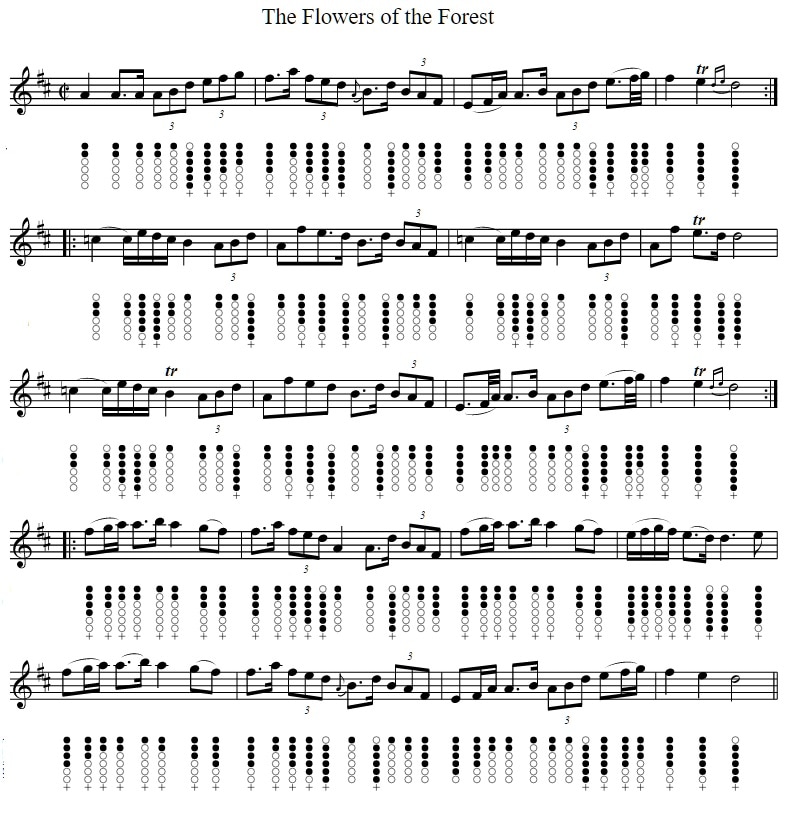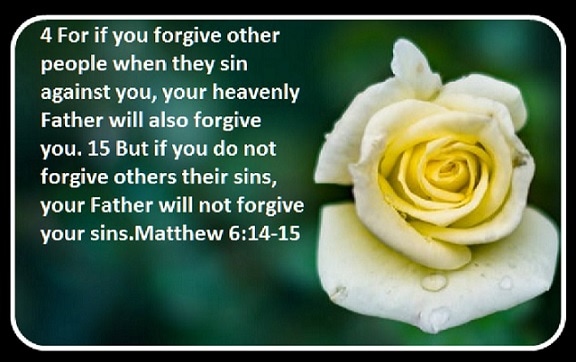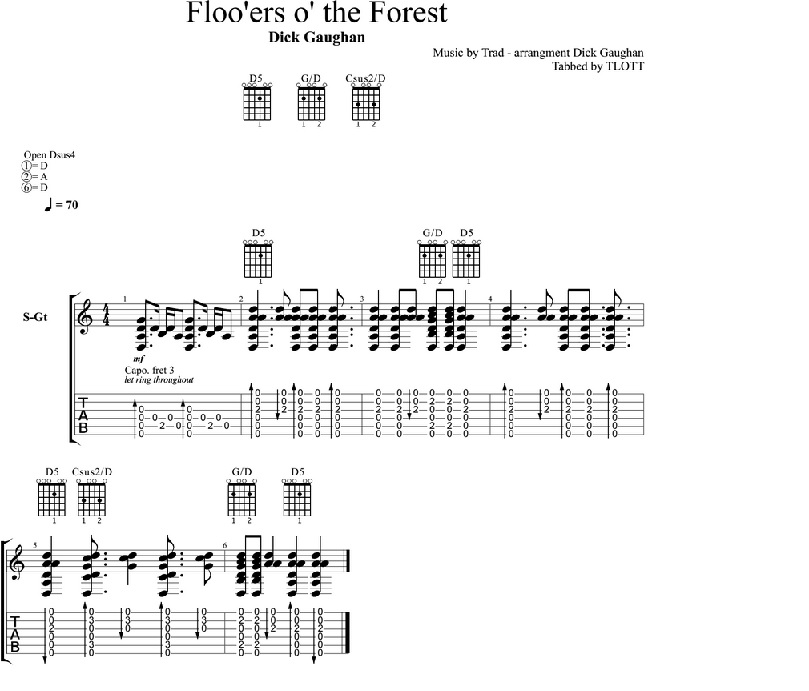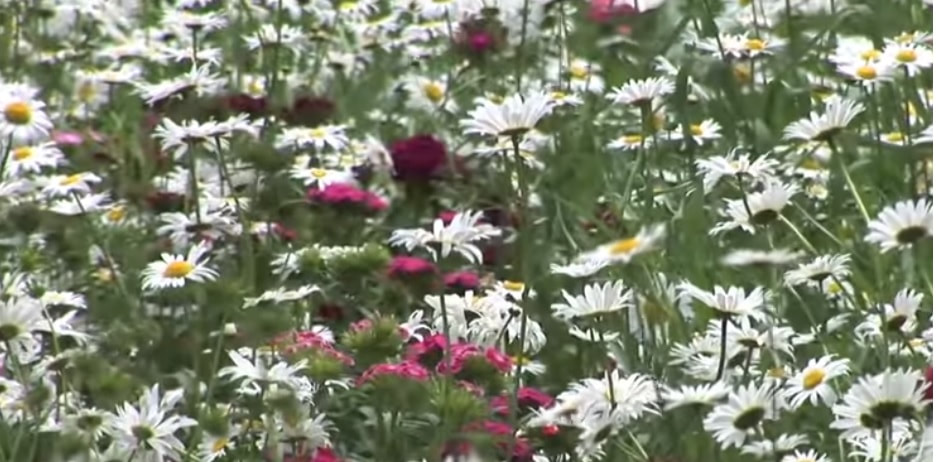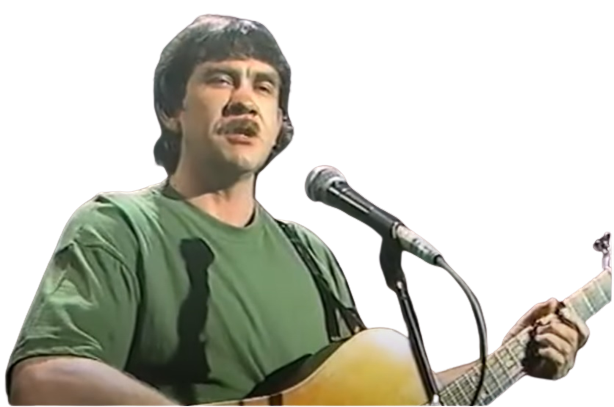The Flowers Of The Forest Lyrics And Chords
Words and music by Jean Elliot 1727-1805. This song is about the soldiers who never returned after the battle of Flodden in 1513. Over 10,000 Scottish men were killed in the battle along with their king James IV.
The tune of the song may actually be older, it's a favorite tune on the pipes in Scotland. Recorded by Dick Gaughan among others. Dick uses a capo on the 3th fret and plays a more complicated set of chords that are given here. Also included is another song that was recorded by Dick, The Worker's Song. More Scottish Lyrics And Chords .
The tune of the song may actually be older, it's a favorite tune on the pipes in Scotland. Recorded by Dick Gaughan among others. Dick uses a capo on the 3th fret and plays a more complicated set of chords that are given here. Also included is another song that was recorded by Dick, The Worker's Song. More Scottish Lyrics And Chords .
[G]I've heard them liltin', [D]at the ewe[C] milk[D]in,'
[G]Lasses a-liltin' be[D]fore dawn of [G]day.
[D]But now [F]they are moan[C]in', on [G]ilka green [C]loan[D]in'.
The [G]flowers of the [C]forest are [D]a' wede a[G]way.
As boughts in the mornin', nae blithe lads are scornin',
Lasses are lonely and dowie and wae.
Nae daffin', nae gabbin', but sighin' and sobbin',
Ilk ane lifts her leglin, and hies her away.
At e'en in the gloamin', nae swankies are roamin',
'Mang stacks wi' the lasses at bogle to play.
But ilk maid sits drearie, lamentin' her dearie,
The flowers of the forest are a' wede away.
In har'st at the shearin' nae youths now are jeerin'
Bandsters are runkled, and lyart, or grey.
At fair or at preachin', nae wooin', nae fleecin',
The flowers of the forest are a' wede away.
Dool for the order sent our lads to the Border,
the English for ance by guile wan the day.
The flowers of the forest, that fought aye the foremost,
The prime of our land lie cauld in the clay.
We'll hae nae mair liltin', at the ewe milkin',
Women and bairns are dowie and wae.
Sighin' and moanin' on ilka green loanin',
The flowers of the forest are all wede away.
[G]Lasses a-liltin' be[D]fore dawn of [G]day.
[D]But now [F]they are moan[C]in', on [G]ilka green [C]loan[D]in'.
The [G]flowers of the [C]forest are [D]a' wede a[G]way.
As boughts in the mornin', nae blithe lads are scornin',
Lasses are lonely and dowie and wae.
Nae daffin', nae gabbin', but sighin' and sobbin',
Ilk ane lifts her leglin, and hies her away.
At e'en in the gloamin', nae swankies are roamin',
'Mang stacks wi' the lasses at bogle to play.
But ilk maid sits drearie, lamentin' her dearie,
The flowers of the forest are a' wede away.
In har'st at the shearin' nae youths now are jeerin'
Bandsters are runkled, and lyart, or grey.
At fair or at preachin', nae wooin', nae fleecin',
The flowers of the forest are a' wede away.
Dool for the order sent our lads to the Border,
the English for ance by guile wan the day.
The flowers of the forest, that fought aye the foremost,
The prime of our land lie cauld in the clay.
We'll hae nae mair liltin', at the ewe milkin',
Women and bairns are dowie and wae.
Sighin' and moanin' on ilka green loanin',
The flowers of the forest are all wede away.
Flowers of the forest mandolin tab
The Worker's Song Lyrics And Chords By Dick Gaughan.
Dick plays this song in the key of Ab. If you want to play along with Dick's version place a capo on the first fret and use these chords.
[G]Come all of you workers who [C]toil night and [G]day
By[C] hand and by brain to earn your pay
Who for [G]centuries long past for no[C] more than your [G]bread
[C]Have bled [G]for your countries and [C]counted your [G]dead
[G]In the factories and mills, in the [C]shipyards a[G]nd mines
We've [C]often been told to keep up with the times
[G]For our skills are not needed, they've [C]streamlined the [G]job
And with [C]sliderule[G] and stopwatch our pride [G]they have robbed[C]
But [G]when the sky darkens and the [C]prospect is [G]war
[C]Who's given a gun and then pushed to the [G]fore
And expected to die for the [C]land of our [G]birth
When [C]we've [G]never owned one [Dm]hand[G]ful of earth?
G C G C G
[G]We're the first ones to starve [C]the first [Am]one[G]s to die
The [C]first ones in line for that [G]pie-in-the-sky
And always the last when the [C]cream is shared [G]out
[C]For the worker is [G]working when the [Dm]fat cat's a[C]bout
All of[G] these things the worker has done
From [C]tilling the fields to carrying the gun
We've been [G]yoked to the plough since [C]time first be[G]gan
[C]And always ex[G]pected to carry the can
Dick plays this song in the key of Ab. If you want to play along with Dick's version place a capo on the first fret and use these chords.
[G]Come all of you workers who [C]toil night and [G]day
By[C] hand and by brain to earn your pay
Who for [G]centuries long past for no[C] more than your [G]bread
[C]Have bled [G]for your countries and [C]counted your [G]dead
[G]In the factories and mills, in the [C]shipyards a[G]nd mines
We've [C]often been told to keep up with the times
[G]For our skills are not needed, they've [C]streamlined the [G]job
And with [C]sliderule[G] and stopwatch our pride [G]they have robbed[C]
But [G]when the sky darkens and the [C]prospect is [G]war
[C]Who's given a gun and then pushed to the [G]fore
And expected to die for the [C]land of our [G]birth
When [C]we've [G]never owned one [Dm]hand[G]ful of earth?
G C G C G
[G]We're the first ones to starve [C]the first [Am]one[G]s to die
The [C]first ones in line for that [G]pie-in-the-sky
And always the last when the [C]cream is shared [G]out
[C]For the worker is [G]working when the [Dm]fat cat's a[C]bout
All of[G] these things the worker has done
From [C]tilling the fields to carrying the gun
We've been [G]yoked to the plough since [C]time first be[G]gan
[C]And always ex[G]pected to carry the can
Introduction
Dick Gaughan is a Scottish folk singer, songwriter, and guitarist who has been at the forefront of the folk revival in Scotland since the 1970s. Over the course of his long and illustrious career, he has become one of the most respected and influential figures in the Scottish folk music scene. With his powerful and passionate voice, intricate guitar playing, and socially conscious lyrics, Gaughan has captivated audiences and inspired generations of musicians.
Early Life and Musical Beginnings
Born on May 17, 1948, in Glasgow, Scotland, Richard Peter Gaughan grew up in a working-class family with a strong Irish heritage. His father was a dockworker and his mother was a factory worker, and both were active in the trade union movement. From a young age, Gaughan was exposed to traditional Scottish and Irish music, as well as the political and social issues that would later become a prominent theme in his songs.
Gaughan's musical journey began when he picked up the guitar at the age of seven. He was self-taught and spent countless hours playing and learning traditional songs and melodies. By the time he was a teenager, he had already started performing at local folk clubs and festivals.
In the late 1960s, Gaughan became involved in the Scottish folk scene, which was experiencing a revival at the time. He played in various bands and collaborated with other musicians, honing his skills and developing his unique style. During this time, he also began writing his own songs, often drawing inspiration from his own experiences and the struggles of the working class.
Career and Impact
In 1971, Gaughan released his debut album, 'No More Forever,' which received critical acclaim for its powerful vocals and politically charged lyrics. This was followed by several more albums throughout the 1970s, including 'Kist o' Gold' and 'Coppers and Brass.' These albums established Gaughan as a prominent figure in the Scottish folk music scene and gained him a loyal following.
In the 1980s, Gaughan's career took off internationally when he signed with the prestigious folk label, Topic Records. He toured extensively throughout Europe, North America, and Australia, gaining recognition for his exceptional musicianship and thought-provoking lyrics. His albums 'Handful of Earth' and 'A Different Kind of Love Song' received widespread critical acclaim and solidified his reputation as one of the leading voices of Scottish folk music.
Gaughan's impact on the Scottish folk music scene cannot be overstated. He has been credited with inspiring a new generation of musicians and reviving interest in traditional Scottish music. His powerful and emotive performances have captivated audiences and his socially conscious lyrics have shed light on important issues such as workers' rights, social justice, and the struggles of marginalized communities.
In addition to his solo career, Gaughan has also collaborated with numerous other artists, including Billy Bragg, Martin Carthy, and Andy Irvine. He has also been involved in various musical projects, such as the Scottish supergroup 'Boys of the Lough' and the band 'Five Hand Reel.'
Legacy and Influence
Throughout his career, Gaughan has been recognized for his contributions to Scottish folk music. In 2009, he was awarded the prestigious Lifetime Achievement Award at the BBC Radio 2 Folk Awards. He has also received several other accolades, including the Scots Trad Music Awards' Best Scots Singer Award and the Folk Singer of the Year Award.
Gaughan's influence extends beyond the folk music world. His songs have been covered by a wide range of artists, from indie bands to punk rockers, and his impact on the political and social landscape in Scotland is undeniable. He has been a strong advocate for causes such as Scottish independence, workers' rights, and environmental issues, using his music as a platform to raise awareness and inspire change.
Conclusion
In conclusion, Dick Gaughan is more than just a folk singer. He is a powerful and passionate performer, a masterful guitarist, and a thought-provoking songwriter. Through his music, he has not only entertained audiences but also shed light on important social and political issues. His legacy and influence continue to inspire generations of musicians and his music will undoubtedly continue to resonate with audiences for years to come.
Dick Gaughan is a Scottish folk singer, songwriter, and guitarist who has been at the forefront of the folk revival in Scotland since the 1970s. Over the course of his long and illustrious career, he has become one of the most respected and influential figures in the Scottish folk music scene. With his powerful and passionate voice, intricate guitar playing, and socially conscious lyrics, Gaughan has captivated audiences and inspired generations of musicians.
Early Life and Musical Beginnings
Born on May 17, 1948, in Glasgow, Scotland, Richard Peter Gaughan grew up in a working-class family with a strong Irish heritage. His father was a dockworker and his mother was a factory worker, and both were active in the trade union movement. From a young age, Gaughan was exposed to traditional Scottish and Irish music, as well as the political and social issues that would later become a prominent theme in his songs.
Gaughan's musical journey began when he picked up the guitar at the age of seven. He was self-taught and spent countless hours playing and learning traditional songs and melodies. By the time he was a teenager, he had already started performing at local folk clubs and festivals.
In the late 1960s, Gaughan became involved in the Scottish folk scene, which was experiencing a revival at the time. He played in various bands and collaborated with other musicians, honing his skills and developing his unique style. During this time, he also began writing his own songs, often drawing inspiration from his own experiences and the struggles of the working class.
Career and Impact
In 1971, Gaughan released his debut album, 'No More Forever,' which received critical acclaim for its powerful vocals and politically charged lyrics. This was followed by several more albums throughout the 1970s, including 'Kist o' Gold' and 'Coppers and Brass.' These albums established Gaughan as a prominent figure in the Scottish folk music scene and gained him a loyal following.
In the 1980s, Gaughan's career took off internationally when he signed with the prestigious folk label, Topic Records. He toured extensively throughout Europe, North America, and Australia, gaining recognition for his exceptional musicianship and thought-provoking lyrics. His albums 'Handful of Earth' and 'A Different Kind of Love Song' received widespread critical acclaim and solidified his reputation as one of the leading voices of Scottish folk music.
Gaughan's impact on the Scottish folk music scene cannot be overstated. He has been credited with inspiring a new generation of musicians and reviving interest in traditional Scottish music. His powerful and emotive performances have captivated audiences and his socially conscious lyrics have shed light on important issues such as workers' rights, social justice, and the struggles of marginalized communities.
In addition to his solo career, Gaughan has also collaborated with numerous other artists, including Billy Bragg, Martin Carthy, and Andy Irvine. He has also been involved in various musical projects, such as the Scottish supergroup 'Boys of the Lough' and the band 'Five Hand Reel.'
Legacy and Influence
Throughout his career, Gaughan has been recognized for his contributions to Scottish folk music. In 2009, he was awarded the prestigious Lifetime Achievement Award at the BBC Radio 2 Folk Awards. He has also received several other accolades, including the Scots Trad Music Awards' Best Scots Singer Award and the Folk Singer of the Year Award.
Gaughan's influence extends beyond the folk music world. His songs have been covered by a wide range of artists, from indie bands to punk rockers, and his impact on the political and social landscape in Scotland is undeniable. He has been a strong advocate for causes such as Scottish independence, workers' rights, and environmental issues, using his music as a platform to raise awareness and inspire change.
Conclusion
In conclusion, Dick Gaughan is more than just a folk singer. He is a powerful and passionate performer, a masterful guitarist, and a thought-provoking songwriter. Through his music, he has not only entertained audiences but also shed light on important social and political issues. His legacy and influence continue to inspire generations of musicians and his music will undoubtedly continue to resonate with audiences for years to come.


